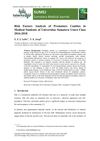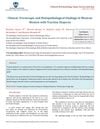 2 citations,
April 1999 in “Dermatologic Clinics”
2 citations,
April 1999 in “Dermatologic Clinics” The paper concludes that creating a natural-looking hairline in hair restoration is important for facial aesthetics and involves careful planning and realistic expectations.
 2 citations,
September 1996 in “The American Journal of Cosmetic Surgery”
2 citations,
September 1996 in “The American Journal of Cosmetic Surgery” The authors suggest using a standard system to name hair grafts to improve communication in hair restoration.
 1 citations,
May 2023 in “Jurnal Kedokteran Diponegoro”
1 citations,
May 2023 in “Jurnal Kedokteran Diponegoro” Chemotherapy for prostate, bladder, and testicular cancer patients commonly causes hair loss, fatigue, and decreased appetite.
 1 citations,
December 2022 in “Current Issues in Molecular Biology”
1 citations,
December 2022 in “Current Issues in Molecular Biology” Annurca apple extract improved hair growth in mice and could potentially prevent hair loss.
 1 citations,
January 2017 in “Evolutionary studies”
1 citations,
January 2017 in “Evolutionary studies” Different human traits like skin color and hair type vary between populations due to genetic adaptations to the environment.
 1 citations,
January 2017 in “Journal of Community & Public Health Nursing”
1 citations,
January 2017 in “Journal of Community & Public Health Nursing” Wearing a cap doesn't affect quality of life for Indian men with hair loss, but severe hair loss does lower it. Older men have more severe hair loss, and those who wear caps more often want less treatment.
 1 citations,
July 2011 in “Climacteric”
1 citations,
July 2011 in “Climacteric” Long-term estrogen therapy in postmenopausal women can improve certain health markers, hair loss is common regardless of hormone use, stopping estrogen doesn't increase breast cancer risk, smoking does, and a balanced BMI is linked to lower mortality.
 October 2024 in “Experimental Dermatology”
October 2024 in “Experimental Dermatology” The belief about hair shedding phases is likely incorrect and needs reevaluation.
 September 2024 in “Heliyon”
September 2024 in “Heliyon” Repeated hair dyeing significantly damages hair.

Photobiomodulation improves the quality of life for people with hair loss.
 August 2024 in “Skin Research and Technology”
August 2024 in “Skin Research and Technology” PRP is an effective and safe treatment for female hair loss.
 July 2024 in “Journal of Cosmetic Dermatology”
July 2024 in “Journal of Cosmetic Dermatology” Vegan collagen builder improves hair growth, skin smoothness, and reduces wrinkles and pain.
 June 2024 in “Dermatology and therapy”
June 2024 in “Dermatology and therapy” Intramuscular injections improved hair density more than intradermal injections for treating hair loss.
February 2024 in “Medicina” AFM can diagnose hair disorders by revealing detailed hair surface changes.
Hair proteins in preschool children and their mothers could indicate developmental changes and health status.
 December 2023 in “EPRA international journal of multidisciplinary research”
December 2023 in “EPRA international journal of multidisciplinary research” Alopecia areata causes sudden hair loss, has genetic links, and can be managed but not cured.
 September 2023 in “Nature Communications”
September 2023 in “Nature Communications” Rare genetic variants in five specific genes are linked to male-pattern hair loss but only account for a small part of the risk.
 July 2023 in “Regenerative Therapy”
July 2023 in “Regenerative Therapy” Stem cell and platelet-rich plasma therapies show promise for COVID-19 related hair loss, but more research is needed.
 July 2023 in “SAS journal of medicine”
July 2023 in “SAS journal of medicine” Certain hair styling methods, like weaving and straightening, are a main cause of hair loss in women from Bamako.
 May 2023 in “Journal of Clinical Medicine”
May 2023 in “Journal of Clinical Medicine” New understanding and treatments for hair loss are improving, but more research is needed.
 December 2022 in “Cureus”
December 2022 in “Cureus” Hormones significantly influence hair growth, with conditions like hirsutism and patterned hair loss linked to hormone levels; more research is needed for full understanding.
 November 2022 in “Journal of Education, Health and Sport”
November 2022 in “Journal of Education, Health and Sport” The skin's bacteria might influence the development of a hair loss condition called alopecia areata.
 June 2022 in “Biomedical reports”
June 2022 in “Biomedical reports” STK11 gene variations do not predict how well metformin will work for PCOS, but may affect hair loss and excess hair growth.
 May 2022 in “Journal of the Egyptian Women's Dermatologic Society (Print)”
May 2022 in “Journal of the Egyptian Women's Dermatologic Society (Print)” Women's hair loss can be due to hormonal changes and various conditions, with treatments focusing on stopping progression and managing symptoms.
 March 2021 in “Actas Dermo-Sifiliográficas”
March 2021 in “Actas Dermo-Sifiliográficas” The microbiome may be linked to hair loss and could be a target for new treatments.
 March 2021 in “Journal of Maxillofacial and Oral Surgery”
March 2021 in “Journal of Maxillofacial and Oral Surgery” Beard hair can be used for hair transplants in severe alopecia cases, with minimal complications and good results.
 January 2020 in “Sumatera Medical Journal”
January 2020 in “Sumatera Medical Journal” Family history and stress are linked to early hair graying, with family history being the main factor.
 January 2020 in “Clinical dermatology open access journal”
January 2020 in “Clinical dermatology open access journal” Changing certain hairstyles can prevent worsening hair loss in Mexican women.
 January 2020 in “Journal of Cosmetics, Dermatological Sciences and Applications”
January 2020 in “Journal of Cosmetics, Dermatological Sciences and Applications” DEEPLY ROOTED® supplement seems to effectively improve hair growth and quality in women with no side effects.
 February 2013 in “Journal of The American Academy of Dermatology”
February 2013 in “Journal of The American Academy of Dermatology” Using hair loss drugs finasteride and dutasteride may cause sexual side effects.



























